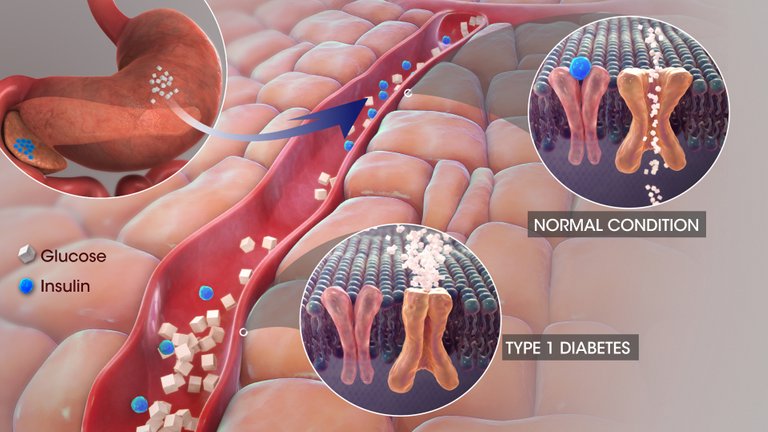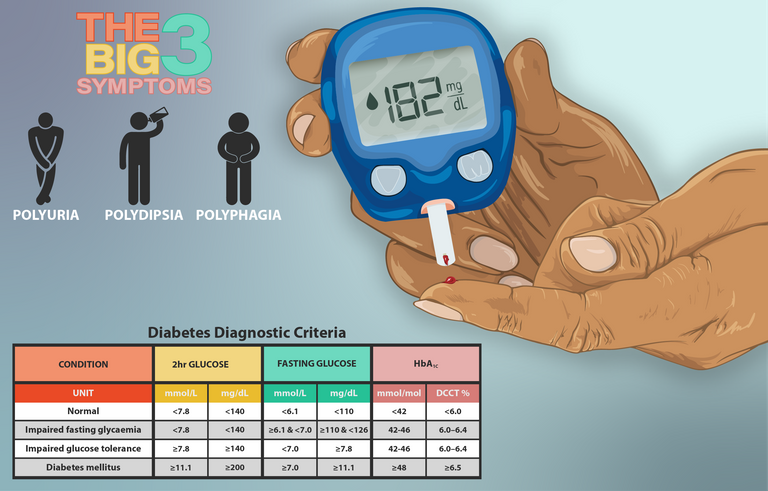Hello friends, today I will be writing on Diabetes 1 and 2. Let me quickly explain that Diabetes insipidus is a diuretic peeing problem that doesn't have anything to do with Diabetes Mellitus. With diabetes insipidus, there is excessive production of dilute urine and increased thirst as a result of insufficient amounts of antidiuretic hormone (ADH) or vasopressin being produced, which is responsible for regulating fluid balance by controlling how the kidney reabsorbs water which would reduce urine output. One is sugar related, the other is excessive urine and it is amazing how they are both diabetes.
When we eat, the pancreas releases insulin to the blood from the beta cells to reduce the blood sugar level as well as other enzymes that break down the food for energy. To do this, the insulin regulates potassium and sugar in the blood going into the cell, but when there is no food and less energy, the pancreas releases glucagon hormone to break down glycogen in the liver, increasing the sugar level in the blood. So the Pancreas the sugar switch in the body, increasing sugar when there is less sugar in the blood and removing sugar from the blood going into the cells. So Insulin is released when blood sugar is high, while glucagon is released when blood sugar is low.
With type 1 diabetes, the body doesn't produce any insulin since the pancreas isn't functioning. The body attacks its pancreas (in a case of an autoimmune condition), and it is genetically transferred from parent to child. Patients with type 1 diabetes depend life-long on insulin being administered to them. With type two diabetes, the pancreas still works a little producing a very little amount of insulin. This is often a result of the type of food eaten and the type of lifestyle the person live causing insulin resistance where the insulin cells do not respond to excessive sugar in the blood. This can also be genetic but it is usually a result of lifestyle.
Diabetes type 2 risk factors include Elevated Blood Pressure (BP MEDs), Blood Sugar over 100 Fasting, Obesity with over 35 and 45 waist size for females and males respectively, and high lipid and cholesterol. Remember I said that the cells stop reacting to blood sugar which could lead to metabolic syndrome. With type 2 diabetes, the browning or darkening of the skin of the neck and armpit is a particular sign of insulin resistance, known as Acanthosis Nigricans. This can lead to Atherosclerosis and can lead to more infections. Excessive sugar in the blood can lead to Nephropathy where the kidney dies causing Renal failure. This can be resolved with a kidney transplant or dialysis. These can also lead to neuropathy, where nerves do not function properly and die, leading to loss of sensation. Patients with diabetes can also have diabetic feet where injuries will have slow wound healing and infection. The sugar increase and stress on the heart can lead to heart disease and possible heart attack.
With Hyperglycemia, the body tries to eliminate the sugar, so it excretes excess urine (PolyUria), Thirst as the body would want more fluid (Polydypsia), and hunger which could be excessive (polyphagia). These are signs that the insulin is not functioning. Hyperglycemia can be caused by Sepsis, Stress, steroids, and skipping insulin doses. Also taking excessive diet simple sugar can cause diabetes type 2. Diagnosis of diabetes would include labs where normal glucose is within 70 to 115, fasting glucose will be less than 100, and hemoglobin (HgBA1C) must be less than 6.5. With Diabetes Mellitus, the glucose level is above 200, fasting glucose above 126, and HgBA1C above 6.5. This doesn't mean that low blood sugar is good as well. Hypoglycemia can lead to brain death. The treatment for this is Insulin Dose to regulate the sugar level.
In the case of Hypoglycemia (Sugar level below 70) which causes brain death, the patient would exhibit signs which include Pale, coolness, Sweaty (Diaphoretic), and Nervous, and when this is noticed. The Patient will have weakness, headache, irritability, anxiety or trembling, hunger, diaphoresis (sweating), and shakiness. This can be caused by diabetic patients doing exercises, during Insulin peak time, and taking alcohol. it is important to increase the sugar level of the patient (doses of candy will do). If patients are asleep, stabbing with dextrose IV will help, and it is important to check for sugar levels at intervals possibly 15 minutes.
With Type 2 Diabetes, it is important to start working on the diet, perform more exercise, and use oral medications (insulin). In cases of peaks, it is important to give food or sugar to increase the amount of sugar in the body. If the patient is sick, you should still give insulin, the glucose level should just be monitored closely. Long-acting insulin is common for old people and should be drawn up in separate syringes. In NPH, it can be mixed. It is intermediate insulin that should not be given in drips/IV cloudy bags. Regular insulin can be given in an IV push or IV bags. It is important to monitor closely for the decrease in sugar levels in the patient. Rapid Active Insulin is usually given during meals or patients must be eating between 15 minutes after the administration.
https://www.cdc.gov/diabetes/basics/diabetes.html
https://www.diabetes.org.uk/diabetes-the-basics/differences-between-type-1-and-type-2-diabetes
https://www.ncbi.nlm.nih.gov/pmc/articles/PMC5723935/
https://www.diabetes.co.uk/conditions/acanthosis-nigricans.html
https://www.medicalnewstoday.com/articles/7504
https://www.ncbi.nlm.nih.gov/books/NBK534841/
https://www.healthline.com/health/diabetes/long-acting-insulin
https://www.cancer.gov/publications/dictionaries/cancer-drug/def/insulin-nph
https://www.diabetes.co.uk/insulin/rapid-acting-insulin.html


Thanks for your contribution to the STEMsocial community. Feel free to join us on discord to get to know the rest of us!
Please consider delegating to the @stemsocial account (85% of the curation rewards are returned).
Thanks for including @stemsocial as a beneficiary, which gives you stronger support.
I always wondered most of the time, do the causes of diabetes only limited to sugar cause
Actually, No. Diabetes causes are not limited to sugar consumption only. It is no doubt that diets high in sugar and refined/simple carbohydrates can play a main role in the development of type 2 diabetes, other factors can also increase the risk of it. Factors such as family history, obesity, high blood pressure, conditions such as polycystic ovary syndrome, and also the use of steroids can also be causes of Diabetes.